Óscar Ortega is one of the newest members of Mariachi Vargas de Tecalitlán, currently on tour with Luis Miguel. A fifth-generation mariachi musician born in Guadalajara, Jalisco, Óscar launched his professional career in the United States, where he earned a reputation as an outstanding violinist and vocalist with high-profile groups like Los Galleros, Los Camperos and Sol de México. Before joining Vargas, he had been a longtime member of Mariachi Nuevo Tecalitlán.
Óscar comes from a musical family and has always been surrounded by musician relatives. His father, trumpeter José Ortega Hermosillo, is a second-generation mariachi musician whose father had a group half a century ago in Zacoalco de Torres, Jalisco known as Los Jilgueros. Óscar’s mother, María del Rosario Ornelas Romero, descends from five generations of mariacheros, going back to her great-great-grandfather Roque Romero who had a mariachi in Talpa, Jalisco in the late 19th century. Óscar’s cousin Felipe “Pike” Romero, formerly of Mariachi Sol de México, also traces his ancestry to that group.
Early History
Óscar began his musical career at age 5, singing on Guadalajara city buses, where he accompanied himself scratching on a soft drink bottle that he used as an improvised güiro. “The song that earned me the most tips,” he remembers, “was a corrido by Ramón Ayala called ‘Dos Monedas.’”
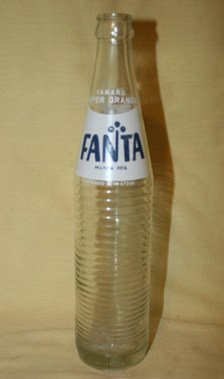
Óscar’s first musical instrument
By age 14, Óscar was playing violin in a youth ensemble called Mariachi Infantil Guadalupano. Seven months later, he joined Mariachi Auténticos Caporales, led by Francisco Armenta, where he stayed for two years before joining Mariachi Los Reyes de Guadalajara, led by Miguel Pacheco. At one point, Óscar’s father and four of his brothers played together in Los Reyes, where Óscar remained for the next two years.
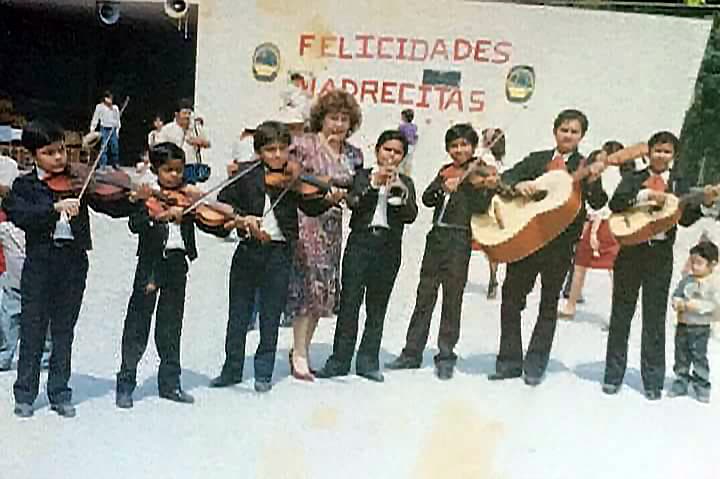
Mariachi Infantil Guadalupano in 1987.
Mariachi from left to right: Óscar Nieves, Nico Nieves, Óscar Ortega, Paco Nieves, Jorge Díaz, Guadalupe Nieves, José Nieves.
“Before I became a mariachi musician, my life was one of dire poverty,” Óscar confides. “There were eight children in our family, and my father spent most of his time working in the United States, just trying to earn enough money to support us.”
Given that his father was absent most of the time, it was his mother, María del Rosario, who bought Óscar his first violin and who sought out violin teachers for him. When a particularly drastic teacher told his parents he wasn’t cut out to be a musician and suggested they sell his violin, his mother challenged that assessment, giving the maestro a piece of her mind: “How can you possibly say my son has no talent? Of all my children, he’s the one who practices the most!” Óscar was later fortunate enough to study with Manuel “El Charol” Caratachea, who became his most influential early violin teacher.
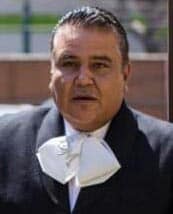
Manuel Caratachea
ADVENTURES IN GRINGOLANDIA
First L.A. Groups
Óscar’s father and brothers traveled frequently to the United States to work as mariachis, and upon turning 18, he decided to follow in their footsteps. The day before Mother’s Day in 1990, he and his brother Gilberto arrived at the mariachi plaza on Boyle Street in Los Angeles, looking for work.
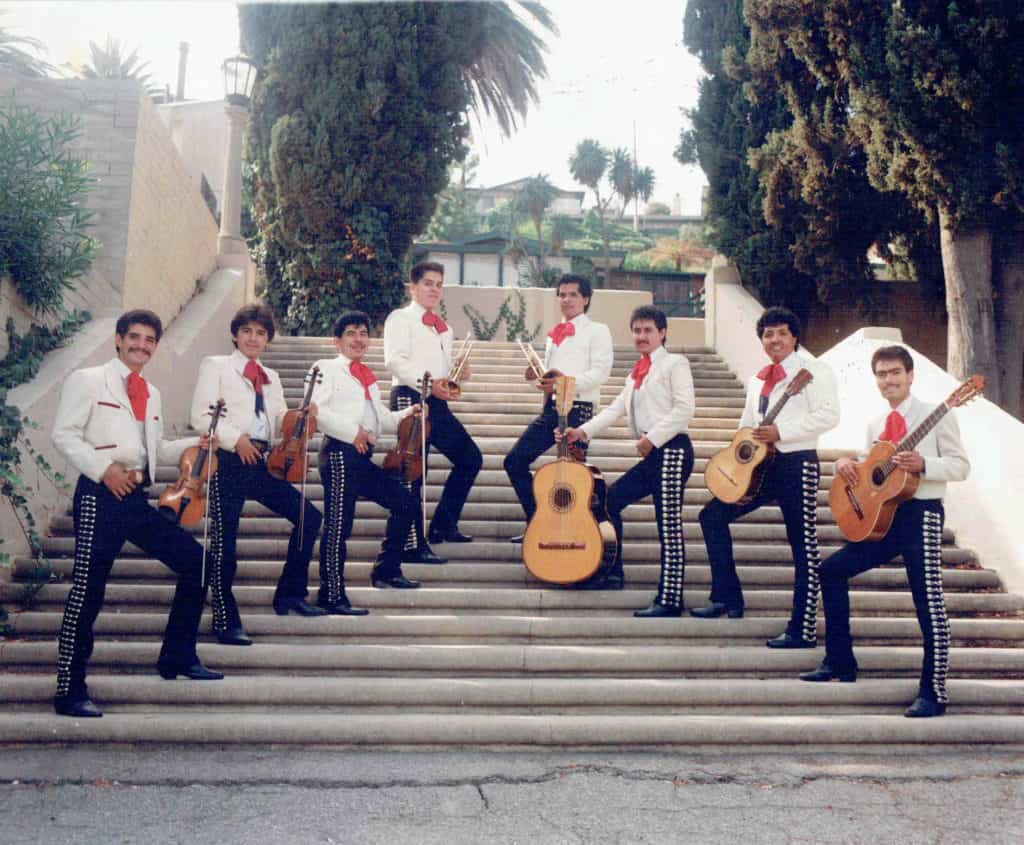
Mariachi Juvenil Tecalitlán de Santiago Alcaraz in 1990
Jesús Magaña, Óscar Ortega, Andrés Neri, Víctor Cervantes, Guillermo Padilla, Fernando Navarro, Álvaro Cortés, Santiago Alcaraz.
Óscar played with many different mariachis during his early years in Los Angeles, but his first steady U.S. group was Mariachi Juvenil Tecalitlán, led by Santiago Alcaraz Vargas, brother of Manuel of Mariachi Vargas fame. Santiago recalls those days:
Óscar was very young and I would call him “mi hijo.” He was quite green, musically speaking, and some of the group members used to say to me, “You should get rid of that kid and replace him with a more experienced musician.” My reply would always be, “He may not play much now, but just give him a little time. That boy is an uncut gem!” I’m very proud of Óscar, and I’m proud to have been able to help him get his start.
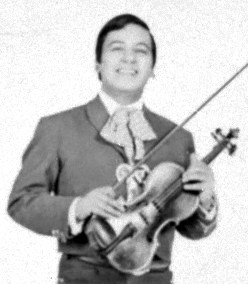
Salvador Torres
Óscar remained with Santiago’s group for almost two years, after which he joined Mariachi Latino de José Cervantes. In that group, he played beside Salvador “El Liri-Liri” Torres, whom Óscar credits as being another of his major violin influences. (Both Salvador and his brother Federico were longtime Mariachi Vargas members.) After nearly a year with Mariachi Latino, Óscar joined his first major ensemble: Mariachi Los Galleros de Pedro Rey.
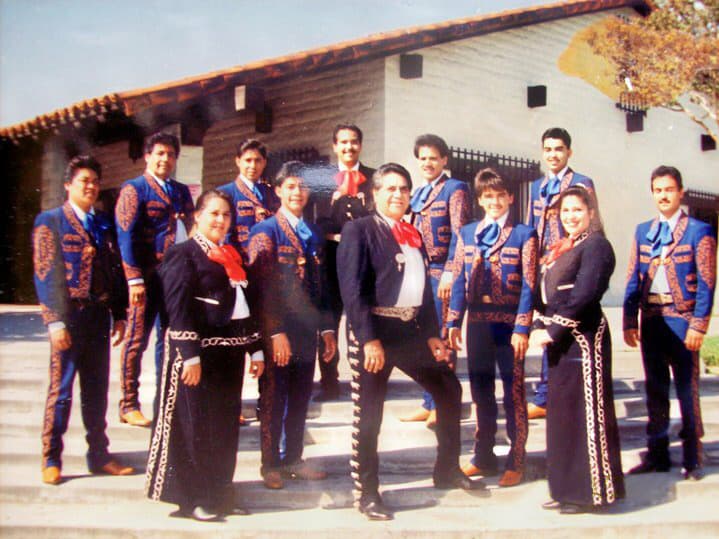
Los Galleros de Pedro Rey in 1992
Back row: José “El Copetón” Mendoza, Regino Almaguer, Esteban Hernández, Juan Manuel “El Toro” Hernández, Arnulfo Nungaray, César Hernández.
Middle row: Joaquín Rodríguez, Óscar Ortega, Ruben Marín.
Front row: Gabriela Hernández, Pedro Rey, Verónica Hernández.
Mariachi Los Galleros
When Óscar joined Los Galleros, the famous restaurant El Rey no longer existed. The group performed at La Carioca, in east Los Angeles, and later at El Premier, in Southgate. Their final planta was Sigo Siendo el Rey, in Pico Rivera, a night club that only lasted one week! Shortly after that, Los Galleros disbanded.
Óscar considers the two years he spent with Los Galleros a key steppingstone in his musical career: “Pedro was a very strict bandleader, extremely demanding. If you didn’t arrive 15 minutes before the prescribed hour, he considered you late! I try to follow that example to this day. Thanks to his harshness, I learned a lot very quickly. Before I joined Galleros, I just played violin and sang occasionally. Pedro was really the one who pushed me out front as a vocal soloist.”
Pedro Rey recalls:
When Óscar first joined my group, he was shy and didn’t want to sing, but I forced him to. Coincidentally, I was the same way when I first joined Los Camperos: I didn’t want to sing, but Nati Cano forced me to. The same way Nati made me sing, I made Óscar sing—and it paid off!
Around that time, Óscar began sitting in on Mariachi Sol de México rehearsals. “After my career with Los Galleros was unexpectedly cut short, José Hernández (Pedro Rey’s younger brother) allowed me to attend Sol’s practice sessions for my own musical advancement, without any agreement that I would enter the group,” he explains.
Mariachi Los Camperos (1st period)
There’s a saying that goes, “When it rains, it pours,” and that’s exactly what happened to Óscar during one auspicious week in 1995. Within a period of several days, he received invitations to all three of Southern California’s top mariachi groups of that era: Mariachi Tlaquepaque de Antonio Ramos, Mariachi Sol de México de José Hernández, and Mariachi Los Camperos de Nati Cano. Óscar explains the dilemma he found himself in:
It was a hard decision to make, but out of those three mariachis, I chose the group with the most collective musical experience. At that time, Los Camperos had a lot of heavy-hitters like Nati Cano, Jesús Guzmán, Mario “El Mono” Rodríguez, Juan Rodríguez, Juan José Almaguer, Ismael Hernández … and I was anxious to learn what each of them had to teach me. In retrospect, it turned out to be a wise decision. Los Camperos has always distinguished itself for having a very ranchero sound that’s stylistically close to the roots of mariachi music.
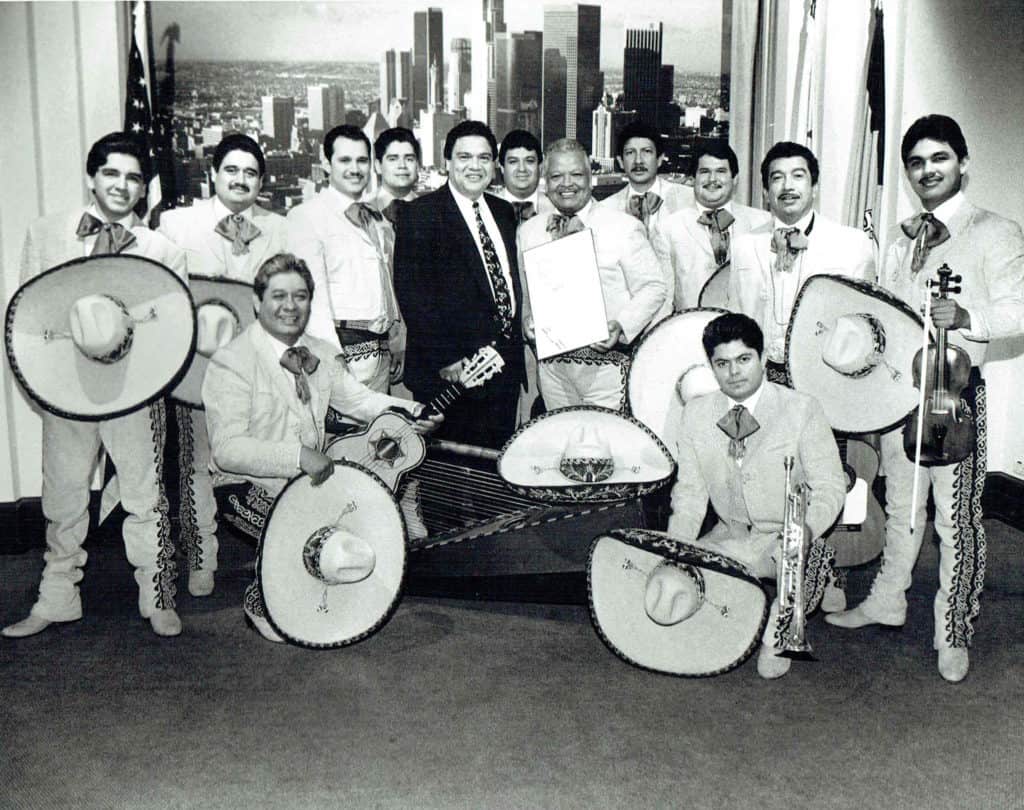
Mariachi Los Camperos de Nati Cano in 1996
Standing: Óscar Ortega, Juan Rodríguez, Juan Morales, Javier Rodríguez, Los Angeles City Councilman Alex Padilla, Juan Jiménez, Nati Cano, Juan José Almaguer, Jesús Guzmán, Arturo Palacios, Alberto Alfaro.
Seated: Luis Damián, Salvador Hernández.
Toward the end of 1997, after Óscar had been in Los Camperos for two full years, he once again received an invitation to join Mariachi Sol de México. This time, says Óscar, the decision wasn’t difficult to make:
The first time José Hernández invited me to his group, he and I had a long conversation. “Before I join your group,” I told him, “I want to learn everything I can from those monsters of the mariachi tradition.” “Don’t worry, Óscarín,” José assured me. “Whenever you’re ready, there’ll be a place for you in Sol de México.”
Óscar’s Wife’s Role in his Career
Ever since I was with Los Galleros, my dream had been to someday play with Mariachi Sol de México. It was also my wife’s dream. Before I joined Los Camperos, and every other time I’ve made a career decision, she and I have sat down and discussed what the best choice for me would be. I’ve always tried to choose what’s best for my own artistic achievement, not just where I could make the most money, and I’ve never made a decision without her support.

Óscar and his wife Blanca
Let me tell you a little about my wife. She’s from the same neighborhood where I grew up in Guadalajara, about five houses away. I’d had girlfriends in the U.S. and other places, but as it turned out, the love of my life was living just across the street. One day when I was visiting my parents, I saw her and said, “I’m not going to let this one get away!” Her name is Blanca Lilia Rodríguez Hernández. We’ve been married for 23 years, and the Lord has blessed us with six children.
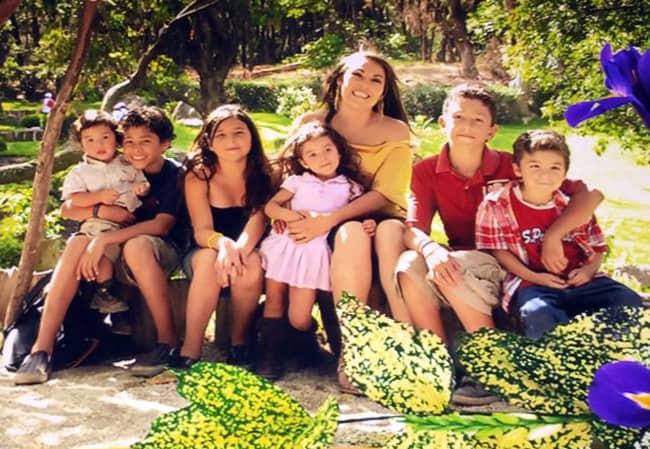
Óscar’s family
Kevin Ortega, Irwin Ortega, Lidia Katherine Ortega, Daphne Ortega,
Blanca Lidia Rodríguez (Óscar’s wife), Óscar Ortega Jr., Derek Ortega.
Mariachi Sol de México (1st period)
When José Hernández asked Óscar to come down to Cielito Lindo restaurant in South El Monte and talk with him about joining Mariachi Sol de México, Óscar’s wife Blanca accompanied him. José formally invited Óscar to the group, and this time he accepted. José has this to say about Óscar:
Since he’d already played with Los Galleros and was familiar with the essence of our style, it was only natural that he eventually join Sol de México. An excellent violinist and vocalist, Óscar is a professional in every sense of the word, and a real perfectionist when it comes to ensemble playing. He’s always been a musician who motivates his compañeros. In fact, he inspired me to write “El Rey de la Huasteca,” when he suggested I compose something new to challenge the violin section. Another quality of his is that he’s always well-mannered and respectful.
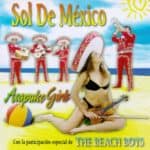
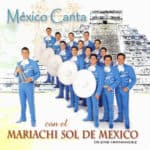
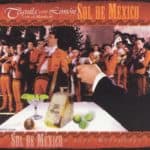
Óscar remained with Sol de México for the next four years, from 1997 to 2000. It was with Sol that he made his first recording, the 1998 crossover CD Acapulco Girls, featuring the Beach Boys. During this period, he also recorded México Canta (1999) and Tequila con Limón (released in 2001). On all three CDs, Óscar played violin on all tracks and contributed chorus parts. “My most famous vocal of that era, one that people still identify with me today, is the José Hernández composition ‘Chatita Linda,’” affirms Óscar. That song (with the lower voice sung by Joaquín Rodríguez) was the promotional cut for the album México Canta.
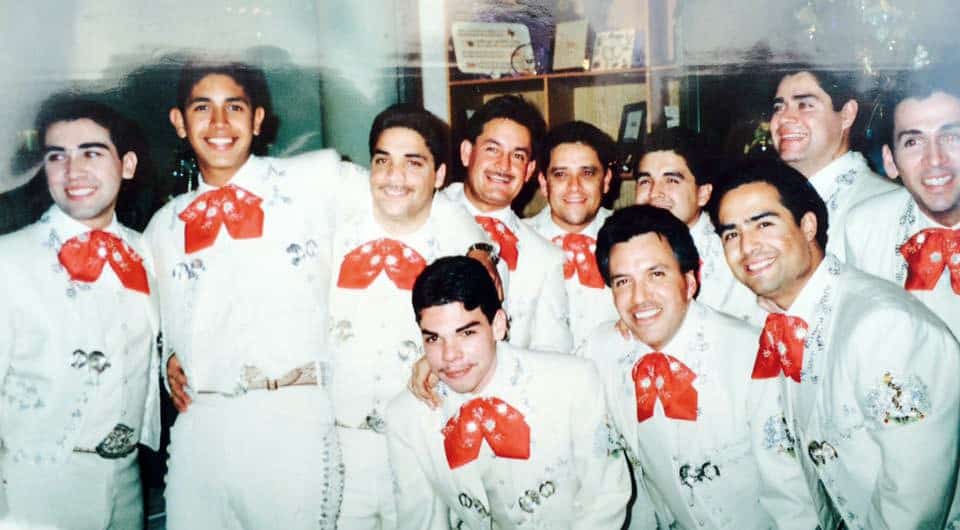
Back row: Dennis Meade, Adrián Vaca, José Manuel Ramírez, Pedro Torres, José Luis Vaca, Óscar Ortega, Javier Rodríguez, Fernando Moreno.
Front row: Mauricio González, Ricardo Cisneros, Héctor Castro.
RETURN TO GUADALAJARA
Mariachi Nuevo Tecalitlán (1st period)
In June of 2000, while Óscar was still with Sol de México, he received an invitation to join Mariachi Nuevo Tecalitlán. After sitting in on a couple of chambas with them during a vacation to Guadalajara, he became excited about working with the group. Discussing it with his wife, the two decided to move back to their home town, and in January of 2001, Óscar brought in the new millennium as a formal member of Mariachi Nuevo Tecalitlán.
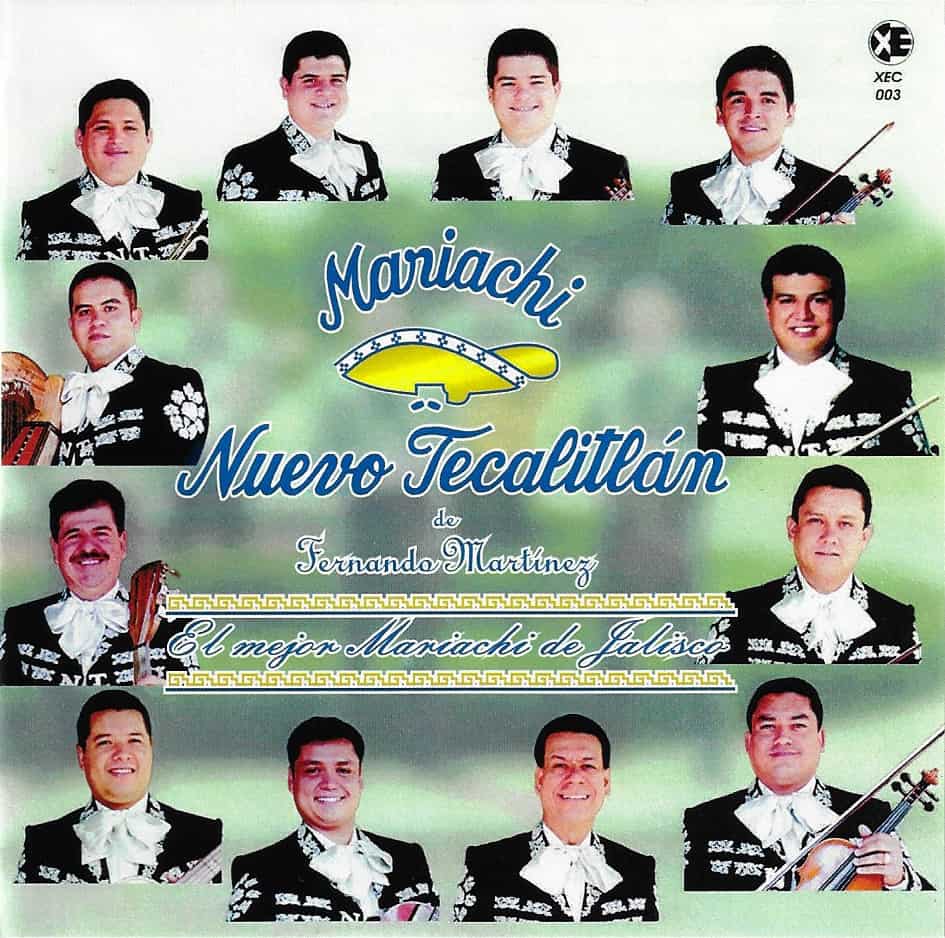
Óscar sings most of the songs on this 2002 CD
Clockwise, starting in upper right-hand corner: Óscar Ortega, Daniel Rosales, Alberto Barajas, Moises Vargas, Andrés González Sr., Édwin Origel, Roberto Hernández, Lupercio Jiménez, Marcos López, Eduardo Ponce, Ángel Martínez, Carlos Martínez.
At that time, the generation of Mariachi Nuevo Tecalitlán we know today was only beginning to come of age. “Carlos Martínez was just starting to write arrangements, and the group still played mainly cover versions of Mariachi Vargas material,” Óscar reminisces. On one 2002 Nuevo Tecalitlán CD, El Mejor Mariachi de Jalisco,his voice is featured on seven tracks, four of which are vocal solos: “Tu Boquita,” “No,” “Vete y Déjame en Paz” and “El Derrotado.”
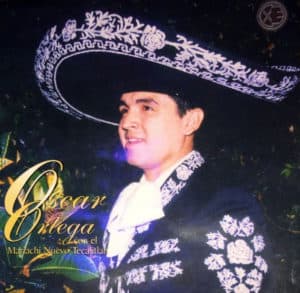
Óscar’s rare 2002 solo CD
Óscar also made a solo album with Nuevo Tecalitlán during this period. “My sole intention was to record a personal souvenir of my singing,” he says. “Only 300 copies were made, and I gave all of them away to family, friends and compañeros. The CD was never offered for sale, and it’s almost impossible to find one today. Carlos Martínez wrote most of the arrangements. I was just beginning to write, so I did a few, and Lalo Cerna did one.”
RETURN TO LOS ANGELES
Mariachi Sol de México (2nd period)
Since Nuevo Tecalitlán didn’t earn much money back then, Óscar and his family were forced to live at his parents’ Guadalajara home. He and his wife longed for their more comfortable life back in the United States, and in early 2003, after Óscar had been in Mariachi Nuevo Tecalitlán for two years, the Ortega family returned Los Angeles, where Óscar rejoined Mariachi Sol de México. This time, he remained with Sol for only two years as well. During this period, they recorded just one CD, Sentimiento Ranchero (2004). Since José Hernández sang all the vocals that disc, Óscar’s voice isn’t featured.
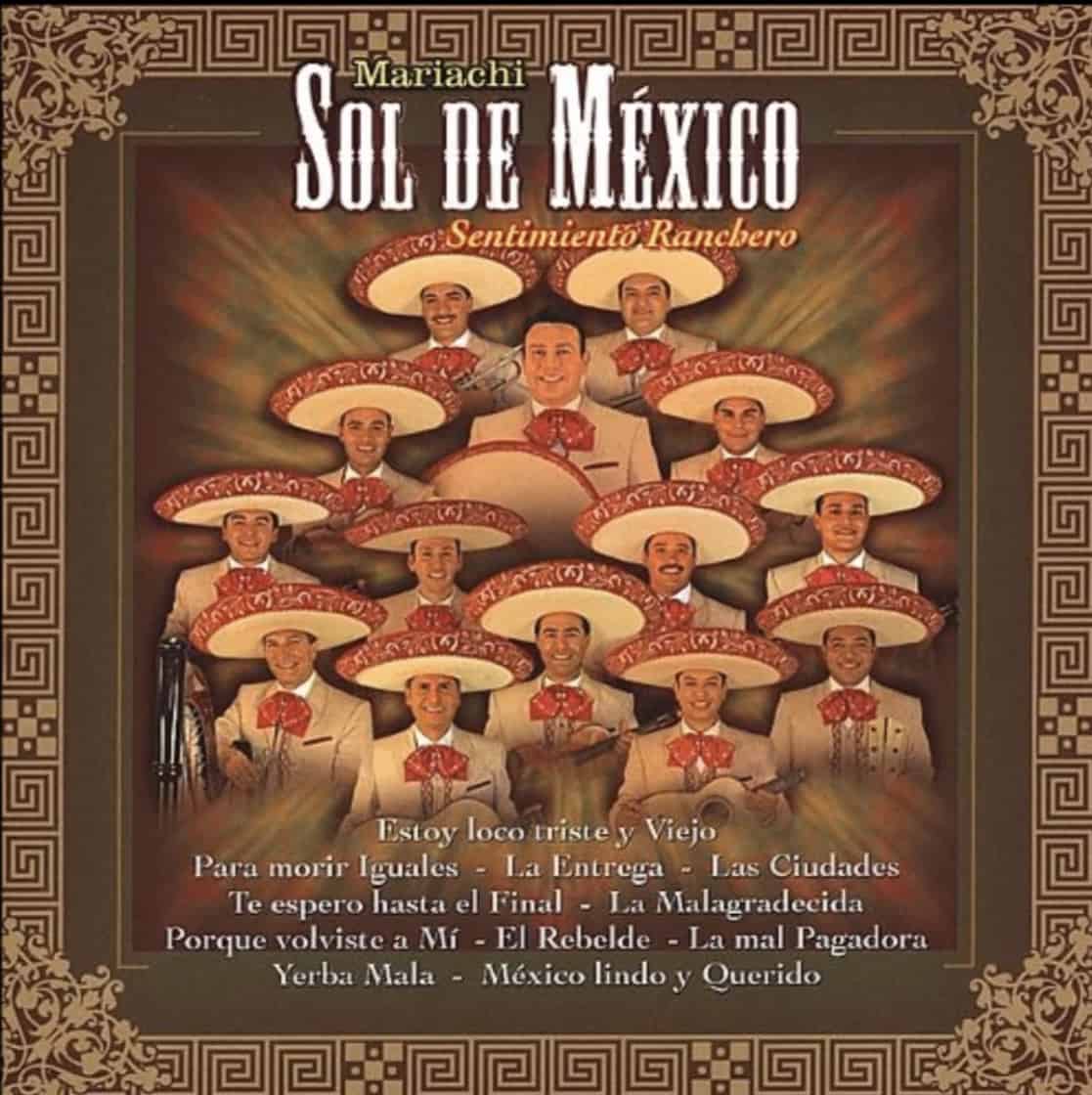
Sol’s 2004 CD Sentimiento Ranchero
Top row: José Manuel Ramírez, Luis Fernando Velásquez.
Second row: Julio Hernández, José Hernández, Raúl Cuéllar.
Third row: Óscar Ortega, Fernando Moreno, Guadalupe González, Erick Hernández.
Bottom row: Arturo Gerst, Jesús Hernández, Héctor Castro, Javier Jáuregui, Mario Hernández.
Longtime Sol de México guitarist Jesús Hernández had the following to say:
Óscar has one of those high tenor voices that’s always in demand, and he’s an excellent violinist who can play any of the three parts with equal proficiency. Besides being a great compañero, he’s a fine human being. To be certain, Óscar is a major asset to any mariachi that’s fortunate enough to have him in their group.
Mariachi Los Camperos (2nd period)
After leaving Sol again, Óscar returned to Mariachi Los Camperos, where he remained for a second two-year period, from 2005 through 2006. During neither of his stints with the group did Los Camperos make any recordings. While his first tenure with Camperos had been one of intense apprenticeship, now, after a decade of playing with Sol de México and Nuevo Tecalitlán, Óscar had become a seasoned musician. “This time around, it wasn’t so much a question of learning new material and techniques, but rather one of adapting to their style of playing,” he recalls. Jesús “Chuy” Guzmán, director of Los Camperos, says the following: “Óscar is a complete musician: a good vocalist, a good instrumentalist, and a good compañero. Wherever he goes, he shines!”
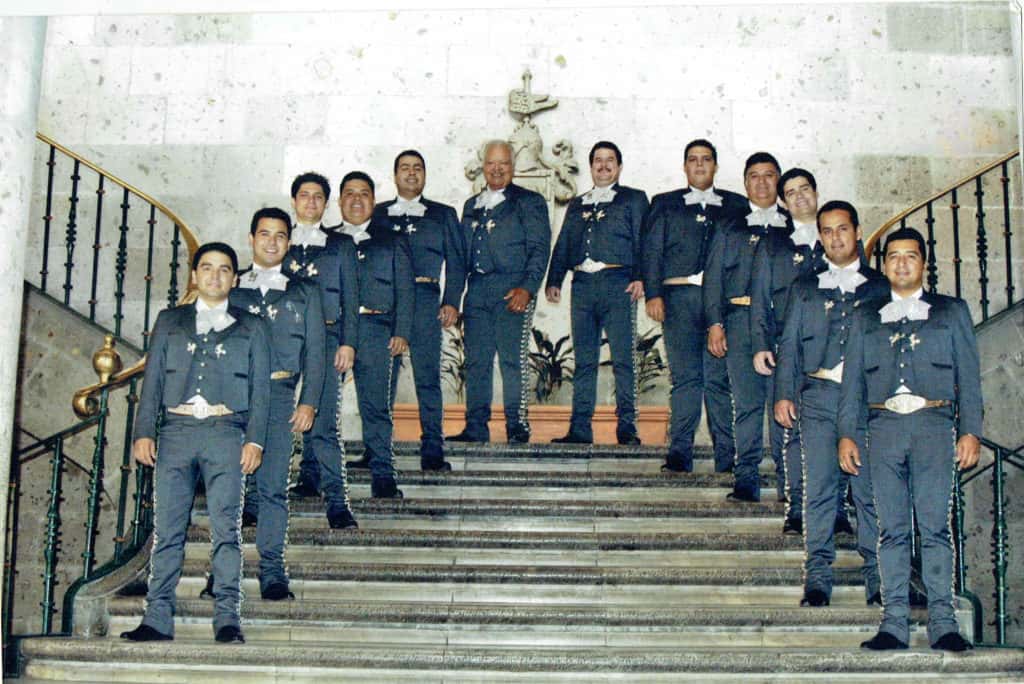
Los Camperos visit Guadalajara in 2005
Left to right: Óscar Ortega, Martín Padilla, Jaime Cuéllar, Ismael Hernández, Miguel Guzmán, Nati Cano, Jesús Guzmán, David Gómez, Juan Jiménez, Javier Rodríguez, Sergio Alonso, Germán López.
OSCAR LEADS HIS OWN GROUP
Mariachi Internacional Tapatío
In 2007, Óscar formed his own Los Angeles-area group, Mariachi Internacional Tapatío. Julio Hernández, a member of the ensemble for over a year, remembers that period well:
Óscar formed his group shortly after he left Mariachi Sol de México, where he and I had worked together. Mariachi Internacional Tapatío performed at a restaurant called Casa Sánchez, in Culver City. The group sounded very, very good, and we made a nice CD. We played Mariachi USA twice and were just beginning to break into the mariachi festival circuit when Óscar moved back to Guadalajara and the group fell apart.
I have nothing but good things to say about Óscar. He learns his parts well and is always enthusiastic, ¡con ganas de trabajar! And he’s honest and straightforward about everything. I’m proud to be his friend, and it gives me great satisfaction that his dream has come true, and that he’s finally arrived where he always wanted to be.
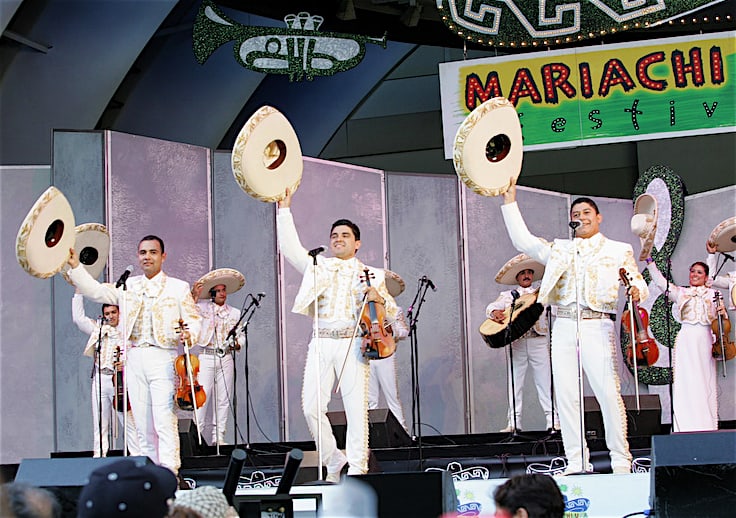
Mariachi Internacional Tapatío de Óscar Ortega at Mariachi USA in 2008
Front row: Julio Hernández, Óscar Ortega, Joaquín Rodríguez.
Back row: Samuel Yáñez, Víctor Cervantes, Rubén Marín, Ruby Torres.
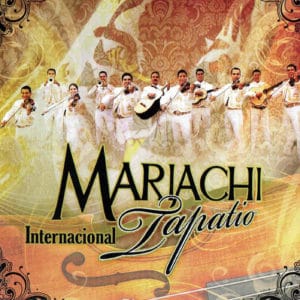
Mariachi Internacional Tapatío’s only CD
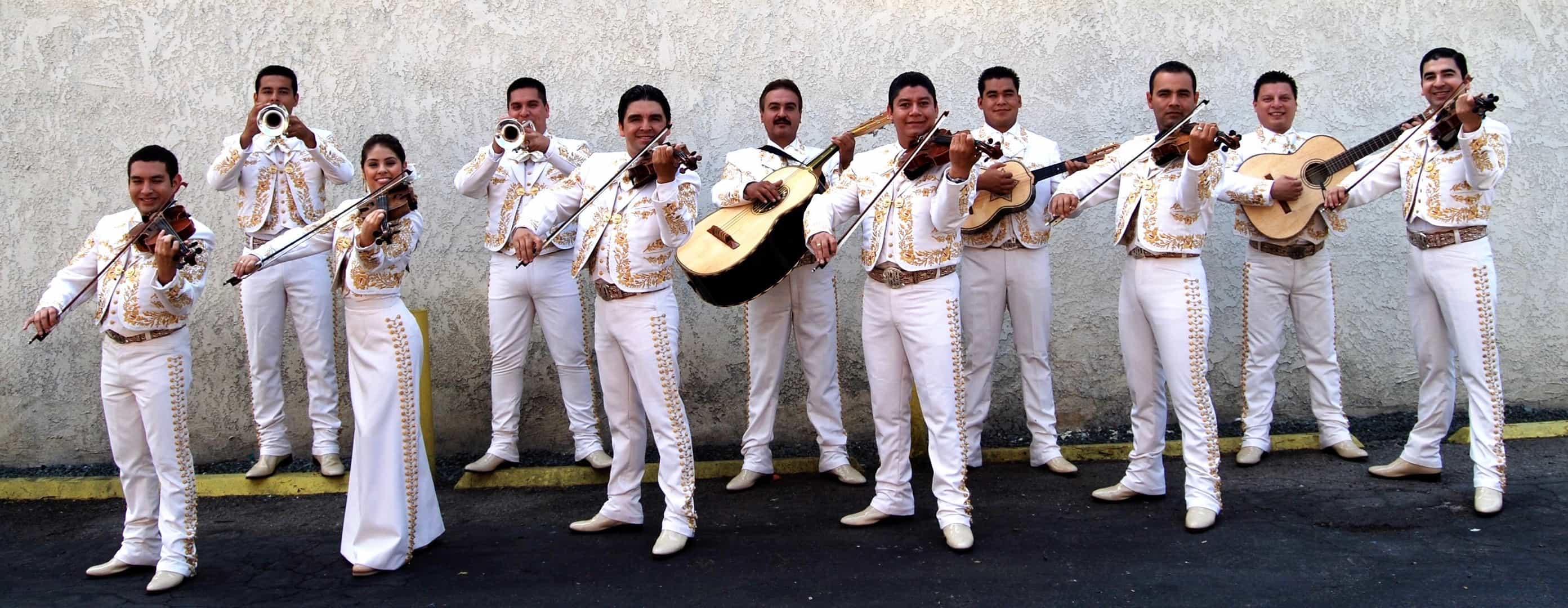
Mariachi Internacional Tapatío in 2008
Samuel Yáñez, Roberto García, Ruby Torres, Víctor Cervantes, Óscar Ortega, Rubén Marín, Joaquín Rodríguez, Reynaldo García, Julio Hernández, Rufino Menjares, Fernando Ortega.
BACK IN GUADALAJARA
Mariachi Nuevo Tecalitlán (2nd period)
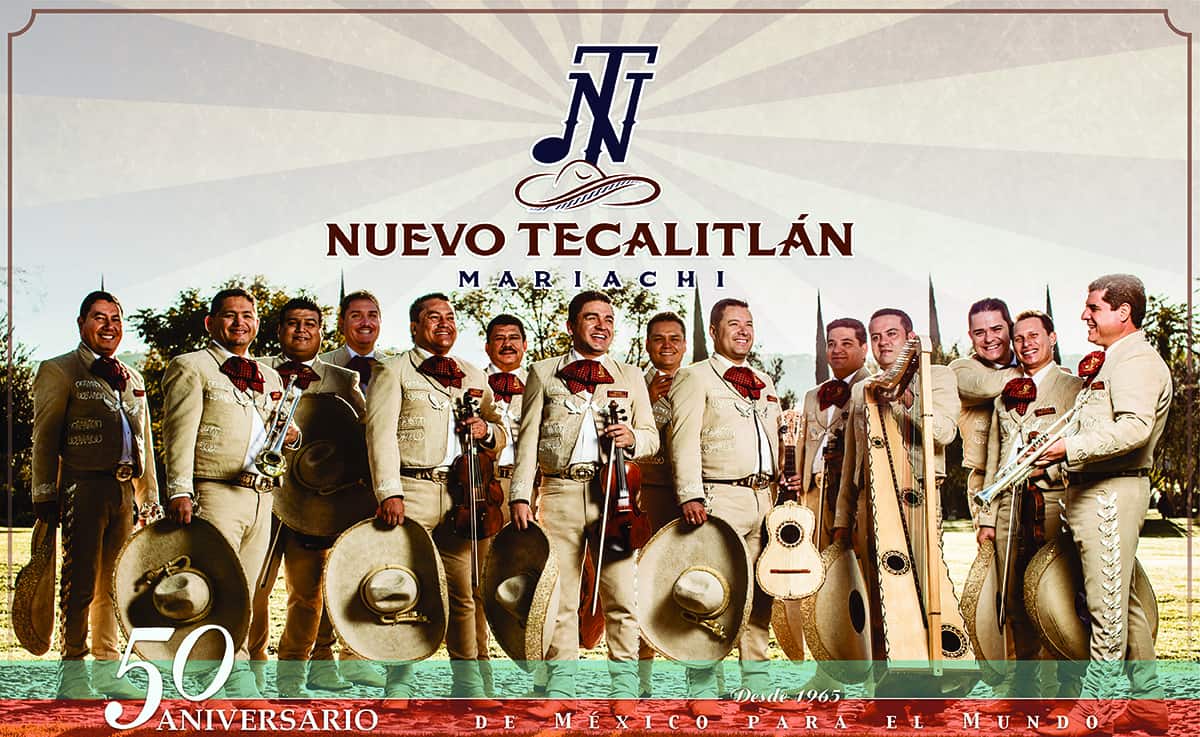
Mariachi Nuevo Tecalitlán in 2015
Francisco Aguilar, Eduardo Cerna, Daniel Rosales, Moises Vargas, Manuel García, Óscar Ortega, Edwin Origel, Roberto Hernández, Óscar Arellano, Marcos López, Alejandro Martínez, Steeven Sandoval, Ángel Martínez.
By 2010, Óscar was weary from the burden of group leadership. When he received an offer from Carlos Martínez to rejoin Mariachi Nuevo Tecalitlán, he accepted. Óscar’s brother Fernando took over the group, but Mariachi Internacional Tapatío disbanded shortly afterward.
Óscar tells the story about his return to Guadalajara and to Mariachi Nuevo Tecalitlán:
I rejoined Mariachi Nuevo Tecalitlán on June 1, 2010. Like I explained earlier, my first time around, the group was just beginning to stretch its wings. But by the time I returned eight years later, Nuevo Tecalitlán was a major force in the mariachi world with a strong musical identity of its own, thanks in great part to Carlos Martínez, who by then had become a distinguished arranger and musical director in his own right. They had much more work and charged more money, too. Whereas during my first period with the group my wife and kids had to share a house with my parents, this time we were able to rent a house of our own, and we eventually bought our own home. We remained in Guadalajara for seven happy years.
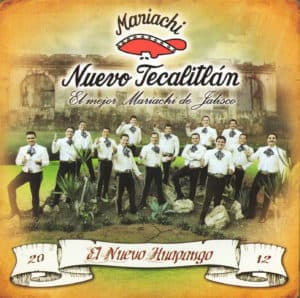
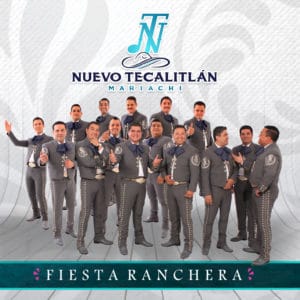
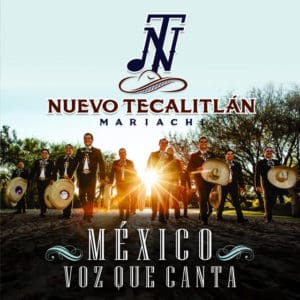
During this second period, Óscar recorded three CDs with Nuevo Tecalitlán: El Nuevo Huapango (2012), Fiesta Ranchera (2017) and México, Voz que Canta (2018). Three of his most famous vocal solos from these albums are “Échame a mí la Culpa,” “Te Quise Olvidar” and “Mi Mayor Anhelo.” Mariachi Nuevo Tecalitlán director Ángel Martínez says this about Óscar:
He’s a valuable musician and violinist, but what characterizes him most is his unique, high voice. He was a street singer as a child, so he has a huge repertory of popular songs. Óscar truly loves to sing, and what he loves to sing most are rancheras and sones; boleros, not so much. When he was in our group, he would say, “Take advantage of me. Give me lots of songs, because I want to sing!”
Óscar has always had a keen ear and been extremely good at transcribing arrangements off of records. He also has a good command of music theory. His musical opinion carries a lot of weight with his compañeros. He’s a natural leader, extraordinarily energetic, and he loves to practice and rehearse.
Mariachi Vargas de Tecalitlán
In June of 2017, Óscar and his wife were thinking of returning to the United States when Carlos Martínez—current musical director of Mariachi Vargas—asked Óscar if he could fill in for Pepe Martínez Jr., who had recently left the group. The substitute gig was only supposed to last until the end of that year, after which the Ortega family planned to move back to the states. Óscar explains how he came to be a Mariachi Vargas member:
One day Carlos unexpectedly said to me, “Guess what? We’re officially inviting you to join the group.” At that moment, my plans changed, and I never moved back to the United States. I played my first performance as full-fledged member of Mariachi Vargas on June 9, 2017.
Carlos Martínez has the following to say about Óscar:
A mariachi is a union of diverse talents where every member makes a unique contribution. Óscar made major contributions to Mariachi Nuevo Tecalitlán, and now he’s doing the same with Mariachi Vargas. He has an impressive track record, and he’s always studying and improving. He continues to take violin and voice lessons to this day. Óscar strives to be in the vanguard, and he’s exactly the kind of musician Mariachi Vargas needs.
QUESTIONS FREQUENTLY ASKED OF ÓSCAR
mm.com: What is your role in Mariachi Vargas?
Óscar: I play second violin, and I’m one of the lead voices.
mm.com: What are some of the most memorable experiences you’ve had as a member of Mariachi Vargas?
Óscar: One of the biggest is the Encuentro Internacional del Mariachi, in Guadalajara. I had performed there before with other groups, but with Vargas, it was bigger than life. Another unforgettable experience was when we played at the office of the United Nations in Geneva, Switzerland.
San Antonio’s Mariachi Vargas Extravaganza was particularly memorable for me for two reasons: One was the passion that the students put into the competitions. I’ve been to other events like this, but I’d never before seen this level of competency and enthusiasm. As a mariachi musician, this makes me extremely proud, and it literally made me cry. The other thing I can’t forget about San Antonio is when I sang a capellaand got a standing ovation. It seemed like everyone there wanted to meet me, since I was a new face in Mariachi Vargas, and they really made me feel important!
mm.com: What recordings have you made with Mariachi Vargas?
Óscar: In the short time I’ve been with the group, not very many. We did “Son de los Aguacates,” with the Banda El Recodo, and a couple of rock en español numbers with María León, and that’s the extent of it. But the group plans to record a new album of its own next year.
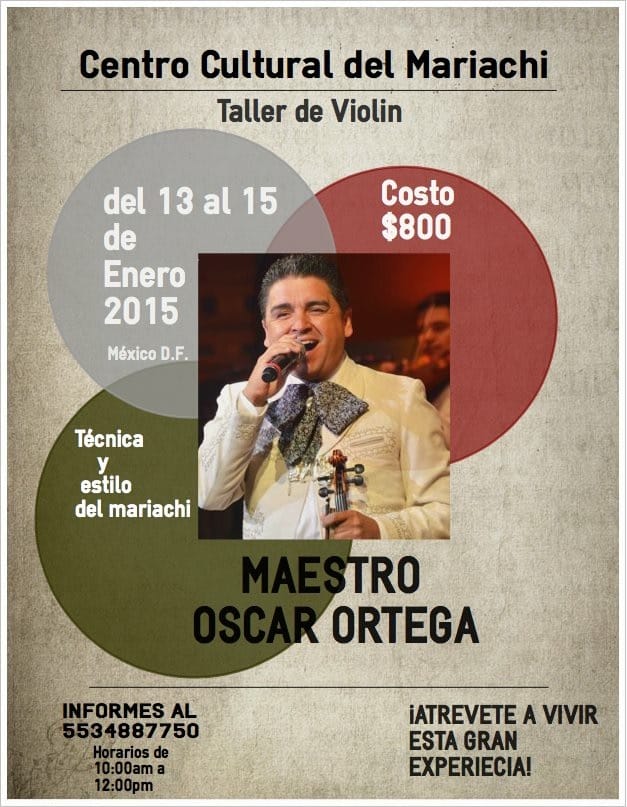
mm.com: Do you teach?
Óscar: Not privately, but I’ve given a few workshops in places like Mexico City, Colombia and Texas. I’d love to teach at the Mariachi Vargas Extravaganza someday.
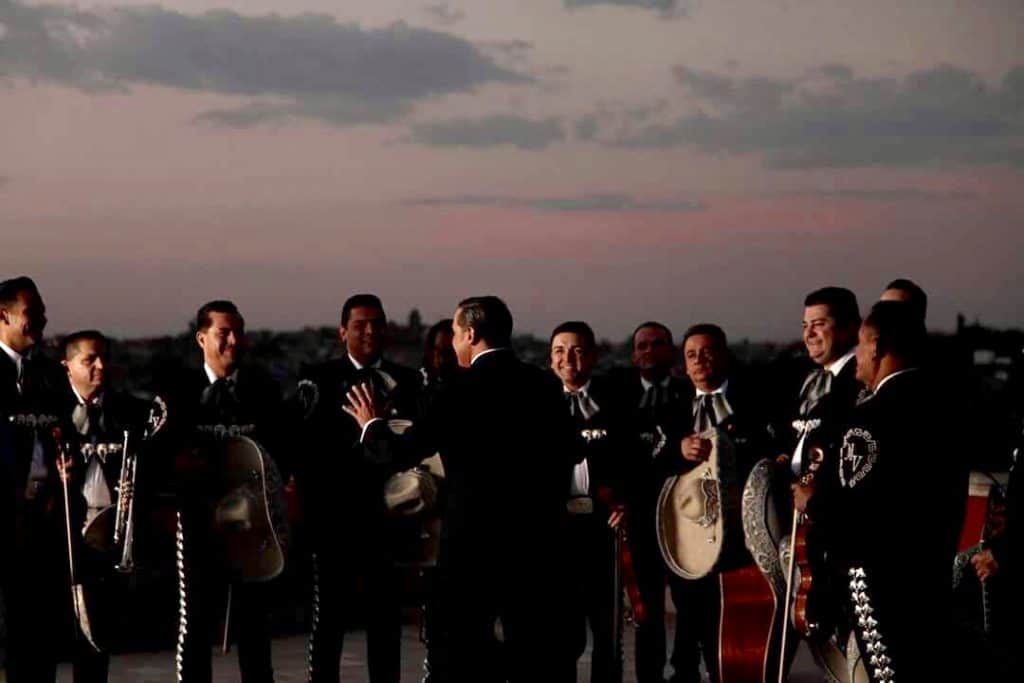
On location at a videotaping with Luis Miguel
mm.com: What can you us about your experience touring with Luis Miguel?
Óscar: The man is a vocal virtuoso. I’ve performed over 70 concerts with him so far, and every one has been sold out. I’ve never experienced anything like this with any other artist I’ve toured with. When the mariachi hits the stage, it’s a state of euphoria. We’re up on a pyramid, with the Mexican flag flying. Just imagine! Luis Miguel designs all the sets and props himself, and he directs all the choreography. His artistic vision is astute. I especially salute him for choosing to record “La Fiesta del Mariachi.” What other major artist would do this? It’s an homage to our genre, and it shows how much esteem he has for our music.
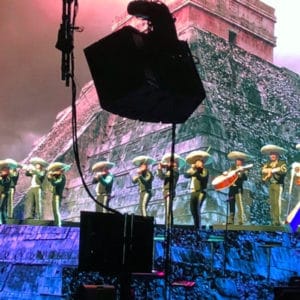
Mariachi Vargas at a recent Luis Miguel concert in Houston
mm.com: Besides Luis Miguel, which other artists have you accompanied over the years?
Óscar: Aída Cuevas, Pepe Aguilar, Cristian Castro, Jenny Rivera, Pablo Montero, Vicente and Alejandro Fernández, just to name a few.
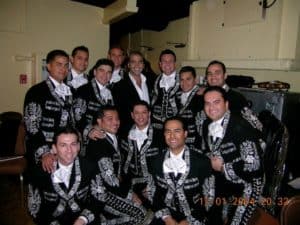
With Sol de México and Alejandro Fernández
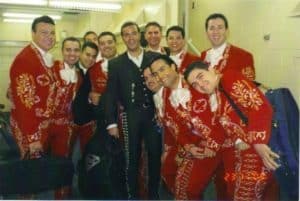
With Sol de México and Pablo Montero
mm.com: Do you have any particular artist memories that stand out from the rest?
Óscar: Yes. Vicente Fernández has been my lifelong idol, and I’ve accompanied him many times. In December of 2014, he and his wife celebrated their 25th wedding anniversary at their ranch Los Tres Potrillos. Vicente asked me to perform there as a guest artist, so I went dressed in traje de charro. His group, Mariachi Azteca, accompanied me. When I finished my set, Vicente grabbed the microphone and yelled, “¡Éste es mi hijo!”
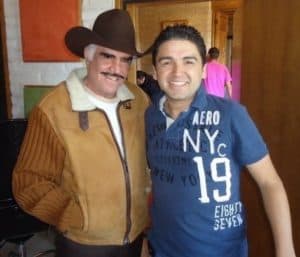
Óscar with his lifelong idol
On another occasion, I was doing a recording session at Vicente’s studio when I showed him an old photograph of my father backing him on trumpet at Chacho’s, a Guadalajara restaurant where Vicente used to sing before he was famous. “That’s Pepe!” exclaimed don Chente. “That’s my father,” I replied. “You’re kidding!” he answered in disbelief. “When are you going to bring him here to visit me?” I took my dad to Vicente’s ranch, and the two embraced and cried. Memories like these are impossible to forget.
mm.com: How does it feel to be a member of Mariachi Vargas de Tecalitlán?
Óscar: You know, the ultimate dream of any mariachi musician is to someday join Mariachi Vargas. This has been the most important opportunity of my life, and a dream I share with my wife and with my mother. I love working with this group, and the members have gone out of their way to make me feel welcome, as has the corporation and the Fuentes family.
Mariachi Vargas is the maximum representative of mariachi music on a world level, and the reception we get really doesn’t compare to that of any other group I’ve ever been in. With other mariachis, people say, “Oh, how wonderful you play!” But with Vargas they say, “Without any doubt, this is the greatest mariachi in the world!”
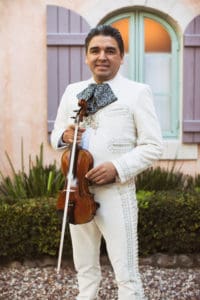
Mariachi Vargas de Tecalitlán fans can see Óscar Ortega perform with Vargas in San Antonio, Texas at the 24th Annual Mariachi Vargas Extravaganza. The concert will be held on Sunday, November 18 at 7:00 PM, at the Lila Cockrell Theatre. For ticket information, visit ticketmaster.com or call (210) 225-3353.

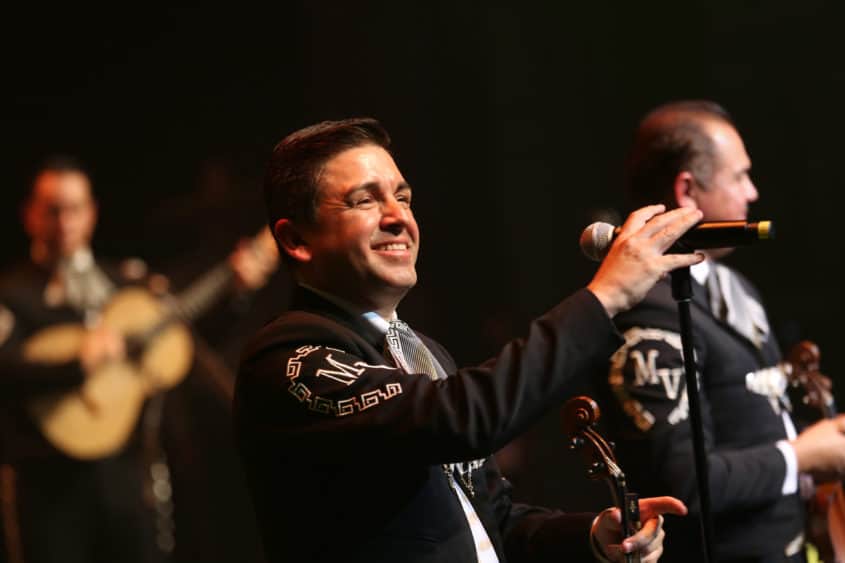





Without a doubt, Oscar is a person who has climbed musically to the best groups and deserves a place like the one he has in Vargas. We hope to continue listening to his voice for a long time in that great mariachi!
This is absolutely beautiful, Jonathan. You captured every essence of el Maestro Oscar Ortega. For anyone who does not know how eloquent and how hard working members there are in Mariachi Vargas de Tecalitlán, you help us appreciate and admire them so much more knowing their complete musical background.
¡Felicidades al Maestro Oscar Ortega y que viva el mariachi!
See you guys at Mariachi Vargas de Tecalitlán Extravaganza ~
¡Felicitaciones en tu trayectoria musical, Oscarín!
So excited to watch you perform, Oscar! ¡Felicidades!
Thank you for your detailed blog on Oscar, Jon. There has been lots of transition in Vargas over the past several years, but one thing I know for sure is that the group always gets better. Oscar is one who proves this. I look forward to reading more of your blogs on additional new members of the group. Thanks again for your hard work!
Nice writing, Jon. Oscar is one of the good guys in our genre who epitomizes what a professional mariachi musician should symbolize!!!
Es impresionante la trayectoria que ha tenido, asimismo el empeño por llegar a su meta, sin duda un gran ejemplo para muchos, pero lo más lindo es la humildad que siempre ha demostrado al no olvidar su historia y su familia. Tengo la dicha de ser parte de su familia y cuando hemos tenido la suerte de que está cerca de Modesto, California, siempre viene a visitarnos y deleitarnos con su hermosa voz. Felicidades por su gran logro, tío, y que Dios lo siga bendiciendo siempre.
Muchas gracias, Jonathan. La verdad estuvo muy bonita la entrevista. No sabía que habías hablado con José, con Chuy y con los demás. Gracias por brindarme este bonito espacio. Dios te bendiga siempre.
¡¡¡Muy completo!!!
Muy bien hecho, Johnny. ¡Wow, qué trayectoria increíble de Oscarín!
¡Excelente publicación, Jonny, como siempre! Y efectivamente, Óscar es un gran talento con larga trayectoria dentro la música de mariachi.
Felicidades, Jonathan. Me gusta tu artículo.
Muy buen artículo del amigo Jonathan. Como siempre, aprende uno algo nuevo. Gracias.
I enjoyed reading about Oscar Ortega. Very informative. Oscar is one of my favorite mariachi singers.
Hi Jonathan, thank you so much for writing this – I really enjoyed reading it. I was wondering if you, or anybody else knew, where I could possible get a copy of Mariachi Internacional Tapatio CD? Seems like the songs/album have been removed everywhere from the internet and I would like to give it a listen again if possible. Thank you!
Great interview and biography of Oscar, Jon. It was throughly enjoyable, and thanks for all your hard work.
Rebecca Gonzales